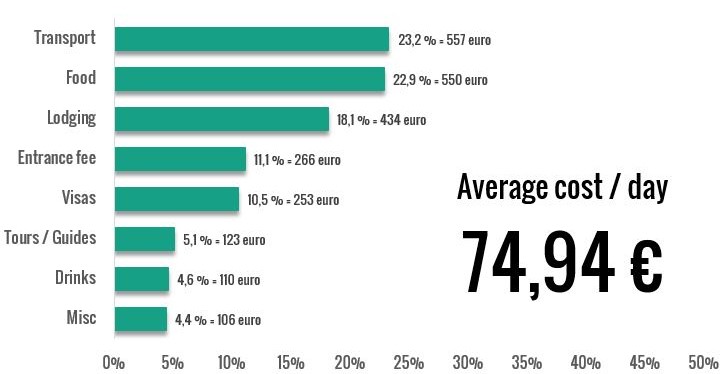A brief (economic) history of China
With almost 1,4 billion people China is the largest country in the world in terms of population. We experienced that is has an interesting history. Before 1800 China was a prominent leader in arts and science. Unfortunately during the 19th and 20th century China experienced some disagreement between provinces resulting in civil wars and instability. Much of this has changed since then. Mainly under the reign of Mao Zedong everyone’s life was strictly controlled leading to more unity, but sadly also the world’s largest murdering. Roughly around 65 million Chinese died as a result of Mao’s attempts to create a new “socialist” China. Every citizen who didn’t agree or was a possible threat to his system was at risk for elimination. Especially highly educated people. Starting from the early 80’s China began moving towards a highly economic oriented country.
In every city we visited we felt the rapid expansion. Hundreds of houses and factories are being built. Roads are being rebuilt and every town has a lively sort of economical buzz. As a result China isn’t that cheap anymore to travel in. In no way this can be compared to cheaper destinations in the near surroundings like Thailand, Cambodia, Vietnam, etc…
On average we’ve spend ~75 euro / day for two persons.
Summary of our expenses

- We stayed 32 days and spent for 2 persons: 2398€
- Our daily average for two persons: 74,94€
- Exchange rate: 1€ = 7,5 Yuan
Transport (23,2% = 557 euro)
This was our biggest cost because we covered a lot of land. A quick calculation on google maps showed us 5 487 km (just from city to city). The cheapest way to travel in China is by train (or night train), but you need to buy your tickets in advance as they can get fully booked.
Tip: try the website or app ctrip. They show you all the trains and schedules. You can also buy tickets through this website and pick the tickets up at any train station. Keep in mind that they charge 30 yuan (4 euro) for every ticket you book via ctrip.
Budget tip: we made a Word document with screenshots of the trains on ctrip. This way you have the train number, the city’s name in Chinese language and a clear overview of the tickets you have to book. Plus it makes the communication at the ticket counter so much easier.
Food (22,9% = 550 euro)
Compared to Mongolia, China was a food walhalla. Totally different than your local take-away Chinese restaurant, but certainly equally (or even more) delicious. If you visit Beijing, do try Beijing duck. It was the best dish we had in China! Starting from 160 yuan for two persons (21 euro) with vegetables, rice and everything included. A place we highly recommend because of the outside deck, perfectly served duck and friendly staff is Jingzun restaurant in Beijing. Apart from that the food in China is very affordable. Expect to pay around 40 yuan (5 euro) for a sweet and sour pork with rice in a decent local restaurant. If you want to eat even more cheap there are a lot of street food stalls and hole in the wall restaurants for as little as 20 yuan (2,5 euro) per dish.
Lodging (18,1% = 434 euro)
Prices vary from town to town. But expect to pay around 40 yuan (5 euro) per person if you sleep in a dorm or can share a double room. Our cheapest place we stayed was only 22 yuan (3 euro) in Pingyao. Our most expensive place and strange but true also our smallest and most inconvenient place was in Hong Kong for 170 yuan (22 euro) per person. We basically slept on a table with a mattress on top in a room of less than 3 m².
Entrance fee (11,1% = 266 euro)
China is the clear winner of charging travelers for everything. Entering just a normal city’s park can easily cost you 30 yuan (4 euro). For the major attractions such as the Forbidden city, Summer palace, Yungang caves prices start at 80 yuan (11 euro) per person or more. So if you plan to visit many sights keep in mind that these costs easily add up.
Visas (10,5% = 253 euro)
Chinese visas for Europeans are very expensive. 126,5 euro per person for 30 days. We advise you to get your visas in your home country. We met a lot of travelers who were stuck in a country for 3 weeks because they had problems obtaining a visa. Be prepared that the application center will question everything. Print out (fake) return flight tickets, an itinerary and booked hotels because without you won’t get a visa. Matthias had to fix this with his mobile phone at the parking lot of the center because else wise he drove to Brussels for nothing.
Tours & guides (5,1% = 123 euro)
The only tour we did was to the Chinese wall as this is the most easiest way to visit and also delivers the most “bang for your buck”. We paid 560 Yuan (37 euro) per person. We tried to avoid other tours (e.g. Tiger leaping gorge, Yangshuo bamboo rafting). In our opinion these tours are overpriced and can easily be done by yourself.
Drinks (4,6% = 110 euro)
You won’t get you drunk from beer in China, the strongest pilsner we drank was 2,5%. But Tsingtao and Dali are definitely good beers. Expect to pay around 10 yuan (1,50 euro) for a big bottle (500 ml).
Misc (4,4% = 106 euro)
This is higher than normal because China and definitely Hong Kong is the place to send some packages home. We made well use of it by sending two packages of 4 and 6 kg back home. And we can confirm that our tent, sleeping bags and merino wool pants reached Belgium within two months. The most affordable option is always to send it by surface (boat). Although it takes on average 30 to 90 days to reach its destination. The national postage services Chinapost and Hong Kong post are the most affordable choices. Just go to any office and they will be glad to help you fill in the forms.


